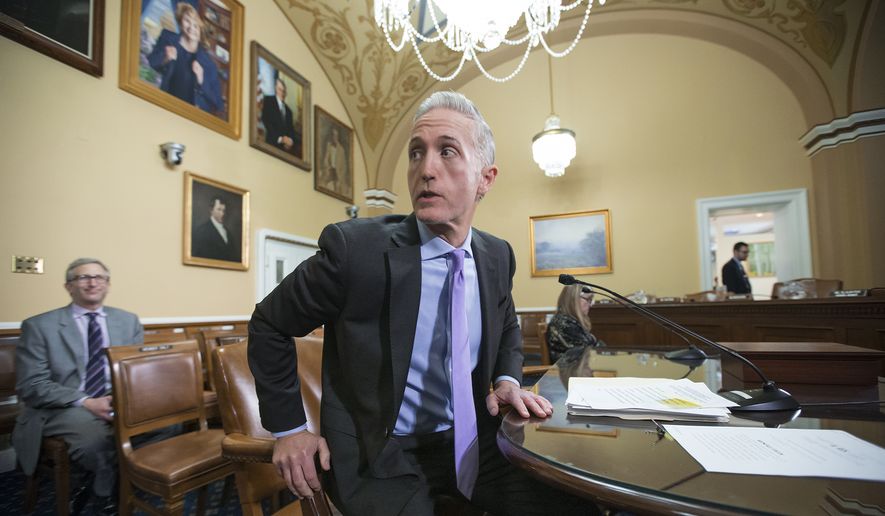Afraid Democrats will leak parts of their investigation to try to help Hillary Clinton’s presidential campaign, Benghazi probe chairman Rep. Trey Gowdy said Wednesday he will impose new limits on the information to which Democrats will have access.
The move marks the latest escalation as all sides prepare for what’s likely to be a politically controversial report later this year on the Sept. 11, 2012, attack on the U.S. outpost in Benghazi, and the handling of it by Mrs. Clinton, then the secretary of state.
Mr. Gowdy, South Carolina Republican, said as they try to wrap up their investigation he asked the top Democrat on the panel, Rep. Elijah E. Cummings, to promise not to leak partial transcripts. He said the Maryland Democrat refused — forcing him to impose the new rules.
Democrats can still review transcripts from the dozens of interviews the committee has conducted, but they are forbidden from taking the documents from the committee. They also are generally restricted to reviewing the materials during office hours.
“I regret this is necessary to prevent the minority from undermining our thorough, fact-centered investigation,” Mr. Gowdy said in a letter to Mr. Cummings.
He said he’d be happy to go back to the previous arrangement should Mr. Cummings agree not to leak anything.
SEE ALSO: Obama won’t meet Fidel Castro during visit to Cuba
Mr. Cummings fired back, saying Republicans are “desperate” to prevent Democrats from trying to undercut the GOP’s investigation.
“Democrats on the Select Committee will not agree to conditions that prevent us from putting out the facts that witnesses have told the Committee in order to rebut the conspiracy theories about Benghazi,” Mr. Cummings said in a statement. “Republicans are writing a secret, partisan report that they plan to make public shortly before the election — and they are violating House Rules in order to try to silence Democrats from putting out the facts before then.”
Mr. Gowdy said he is confident he’s complying with House rules.
Mrs. Clinton is the odds-on favorite to be Democrats’ presidential nominee, but questions about her handling of Benghazi have swirled for years.
The probe into the 2012 attack also helped expose Mrs. Clinton’s decision to refuse a normal State Department email account and instead keep her own account, tied to a server she maintained at her home in New York.
The department has since said the arrangement violated their policy, and both the FBI and the State Department inspector general are reviewing whether classified information was mishandled.
SEE ALSO: Paul Ryan pledges team decision on budget despite conservatives’ rebellion
A federal court ordered the State Department to release more than 30,000 messages Mrs. Clinton belatedly returned to the government, and some 30,000 other messages Mrs. Clinton deemed private could also be forced back into the hands of the government, depending on how a judge rules in an ongoing case brought by Judicial Watch, a conservative public interest law firm.
Judicial Watch on Wednesday released other emails it obtained from the State Department showing Mrs. Clinton repeatedly tried to get a Blackberry device capable of handling classified information, but was rebuffed by the National Security Agency.
The emails released by Judicial Watch detail Mrs. Clinton’s aversion to using a computer for email and her preference for handling messages on a Blackberry.
Donald R. Reid, the department’s assistant director for security infrastructure, wrote in February 2009, after Mrs. Clinton was sworn in but before she set up the private server, that secure Blackberry technology “is not too user friendly, has no infrastructure at State, and is very expensive.”
Whenever the State Department would ask the NSA if they had been able to fix or work around those problems, “we were politely told to shut up and color.”
“These documents show that Hillary Clinton knew her Blackberry wasn’t secure. Then why did she use it to access classified information on her illicit email server?” said Judicial Watch President Tom Fitton. “The FBI and prosecutors ought to be very interested in these new materials.”
• Stephen Dinan can be reached at sdinan@washingtontimes.com.




Please read our comment policy before commenting.